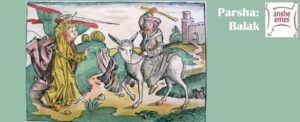I. SUMMARY
A. Balak approaches Bilam. Balak, king of Moav, viewed with dismay the Israelites’ victory over Emor. Dreading an invasion of his own country, he formed an alliance with his former enemies, the Midianites. Balak then sent messengers to ask Balam, a noted sorcerer, to curse the Israelites. Balam asked the delegation to stay with him overnight so that he could ask Hashem whether he could comply with their request. During the night, he was warned not to go with the men, so he sent them away.
B. A Second Delegation Is Sent To Bilam. Thinking that a more tempting offer would prove effective, Balak sent a second delegation, a larger and more prestigious one, offering Bilam great honors and rewards if he would cooperate. Bilam, obviously motivated by personal greed, asked them to remain until he could again receive guidance from Hashem. This time he was permitted to go, but was told to speak only as Hashem directed him.
C. Bilam’s Donkey. During the journey to Balak, Bilam’s donkey saw an angel with a sword obstructing the path and so it turned aside. The impatient Bilam struck the animal several times in an attempt to make it proceed. After the donkey protested this undeserved cruelty, Bilam finally saw for himself the angel and was told that he was at fault by inwardly wanting to accept Balak’s offer. Bilam offered to return home, but was told to continue on his trip and to speak exactly as Hashem ordered him.
D. Balak meets Bilam. Balak met Bilam at the border of the Arnon River and brought him to a nearby city for a feast in his honor. The next day, he took Bilam to a hill (sacred to the worshipers of Ba’al) from where he could see the Israelite camp. After Bilam and Balak sacrificed a ram and a bullock on each of seven altars, Bilam took Balak to stay near the burnt offerings while he withdraw to inquire of Hashem. On his return, he delivered his first speech: “How can I curse the ones that Hashem has not cursed?,” he asked. “Behold, it is a people that lives apart and is not included among other nations.” Angered at Bilam’s unexpected praise for the Israelites, Balak took him to the top of Mount Pisgah, hoping for different results. However, Bilam once again disappointed Balak, declaring that Hashem would not break his promise of blessing Israel and that no magic could prevail against them. In response, Balak asked Bilam to desist from either blessing or cursing the Israelites. Before departing, though, Bilam foretold Israel’s sovereignty and the doom of Moav, Edom and Amalek and other enemies of Israel.
E. The Sin Of The Israelites. The Israelites then encamped at Shittim. Here, the women of Moav, advised by Bilam, tempted the Israelites to join in the worship of Ba’al Peor and to participate in idolatry and immorality. Moshe sentenced the sinners to death and a plague developed among the assembly. Pinchas, the son of Elazar the Kohein Gadol, witnessed a flagrant act of immorality between a Midianite woman and an Israelite. Zealously defending Hashem’s laws, he executed the evildoers. The plague subsided, but only after 24,000 of the congregation had perished.
II. DIVREI TORAH
A. Lil’Mode U’lilamed (Rabbi Mordechai Katz)
1. Bilam’s duplicity and greed. Why is this Parsha named after Balak, a man who set out to destroy the Israelites? If anything, the Parsha might have at least borne the name of Bilam, who at least communicated with Hashem and who blessed the Jews. Chazal teach that for all of Balak’s wickedness, he possessed at least one good attribute — honesty. He made no attempt to conceal his hatred of the Israelites. At least everyone knew where he stood. Bilam, however, did not possess even this attribute. He pretended to be a holy man and to aspire to fulfill only Hashem’s desires. Yet, his actions proved how hypocritical he was. When Balak’s messengers came and offered him wealth and honors in exchange for his curing the Israelites, he didn’t flatly refuse them. Rather, he told them to lodge with him overnight to await Hashem’s verdict, hoping that Hashem would give him permission to comply. The permission was denied, but when the messengers returned with offers of even greater wealth and honors, Bilam again welcomed them into his house. He hadn’t learned his lesson and remained hopeful that he might be allowed to fulfill their wishes. How could he turn down all those riches, even if it required cursing Hashem’s chosen people? And when Hashem did grant him permission this time, he left to fulfill his mission with astonishing swiftness. Nothing could stop him now. His mask of holiness and his greed came through. Unfortunately, there are many who have adopted Bilam’s tactics of pretending to have high moral values and then throwing them aside at the first chance to earn money. They mobilize all of their efforts in an attempt to become wealthy and forget that wealth is a means with which to benefit mankind.
2. The Jewish Family. “How goodly are your tents, Oh Yaakov; your dwelling places, Oh Israel.” This was the blessing that came from Bilam’s lips when he saw the Israelites’ camp. This same blessing — the “Ma Tovu” — is recited daily by Jews throughout the world. Its great importance lies in the fact that it offers appreciation for the foundation of Judaism — the Jewish family. The interaction between family members provides the structure on which Judaism needs to thrive. It is the Jewish family that provides one with love and a sense of worth, and that passes down Hashem’s traditions from generation-to-generation. It is the Jewish family that makes the individual feel part of a group and part of the Jewish nation. The Jewish people are, in reality, one big family and we should emphasize our similarities. This cohesiveness has enabled the Jewish people to survive throughout the hardest of times. It has been the Jewish family that inspired this cohesiveness and tradition.
B. Reflections on the Sedra (Rabbi Zalman Posner)
A Blessing or a Curse? Balam’s above blessing (i.e., the “Ma Tovu”) can also be viewed as a curse. The tone of the Judaism is growth — the constant advancement of spirit, Torah learning and self-development. Self-satisfaction and contentment with past achievement lead to stagnation. The goodness of Yaakov’s tent is to held up as a goal. In spiritual (if not all) affairs, a goal to strive towards gives one a vantage point from where to see more enticing horizons ahead. The higher the attainment, the greater the awareness of the task uncompleted, the greater the appreciation of challenges still faced. Bilam was telling Israel that they were good enough already; that there was no need to be any better. He wished to vitiate the Jews’ urge to strive and improve, since he knew that the soul never stagnates. We are not the same as we were yesterday — either we go up or we go down. Bilam wanted Israel to believe that they had reached the summit. We must remember this potential curse in all realms of our lives and must always be striving to improve.
C. Growth Through Torah (Rabbi Zelig Pliskin)
1. Bias blinds a person from fulfilling Hashem’s will. Rabbi Chaim Shmuelevitz commented that any unbiased person who heard Hashem tell Bilam not to go with Balak’s messengers would understand that Hashem didn’t want him to curse the Jews. We see here the power of bias to blind one from seeing what an unbiased person could see. What did Bilam report back to the messengers? That Hashem considered him so distinguished that Hashem would not allow him to go with them. It is quite possible that Bilam did not merely lie to them. Rather, his own arrogance led him to fool himself as to Hashem’s true intentions. A person hears what he wants to hear. By being aware of our natural tendency to hear what we want to hear, we can avoid many pitfalls.
2. Nothing stands in the way of a strong will. The Talmud notes that while Hashem first instructs Bilam not to go with Balak’s messengers, He later says, “if these people came to call you, rise and go with them.” From here, the Talmud derives the principle “in the way a man wishes to go he is led.” If he wishes to do evil, he will be able to do so (although he will pay a heavy price for the successful completion of his evil desires). Conversely, one who wishes to fulfill Hashem’s Will will be successful. When you wish to pursue a certain path in life, you will be Divinely assisted. “Nothing stands in the way of strong will.” There are many things we wish for half-heartedly, but when you strongly set your mind to something you will have the abilities necessary to meet that goal. What a person truly wants in life he will usually obtain.
3. True compassion is based upon seeing the entire picture. “And Hashem was angry that Bilam went and an angel of Hashem stood in the way for an adversary against him.” Rashi explains that this angel was an angel of mercy who desired to prevent Bilam from transgressing so that he would not be lost. We learn that the angel had a drawn sword. Rabbi Zalman Sorotzkin commented that at times an angel of mercy who is trying to save a person will appear to him as an adversary who is out to harm him. True compassion is based upon seeing the entire picture. For example, a parent who allows his child to do whatever the child wants just because he doesn’t want his child to cry might allow him to do things that are destructive, both physically and spiritually. When you really care about someone, you will not want him to harm himself and will have to be forceful at times to help protect him from his own ignorance or foolishness. Like the angel of mercy, circumstances and friends who appear to be “adversaries” may in fact be doing so for our own good.
4. Be sincere when you reject that you have done wrong. “And Bilam said to the angel, I have sinned for I did not know that you were standing before me in the road. And now, if it is bad in your eyes, I shall return.'” The Midrash comments that Bilam was an cunning and evil person who realized that he had to admit that he was wrong in order to be saved. That is, Bilam was insincere in saying that he made a mistake. True repentance is when a person sincerely rejects a wrong he has done and resolves to correct the situation in the future.
D. Love Thy Neighbor (Rabbi Zelig Pliskin)
We must respect others’ privacy. When Bilam saw that the tents of the Israelites were set up so that the entrance of one did not face the entrance of another, he said the “Ma Tovu” verse. (Rashi). People are naturally curious about the comings and goings of their neighbors. This is exactly why our forefathers and foremothers in the desert encamped in such a manner that would ensure the greatest level of privacy. We, too, have an obligation to respect our privacy.
E. Parsha Parables (Rabbi Moshe Kamenetsky)
The “Ma Tovu” Prayer. While the words of this prayer are elegant, they come from a repulsive source, Bilam, renowned for his cursing abilities. With so many other beautiful words and prayers, why did the Sages choose these words to open up the daily prayers? They wanted to teach us a lesson — first thing in the morning, every day. How? Bilam, accompanied by Balak, set out to find a good vantage point from which to curse the Jews. As they traveled, they thought about the supposedly horrible character of the Jews. The two aroused their evil spirits for the worst curse of all time. But, when they looked what the two saw startled them. The tents of Israel were positioned so as to conform to the highest standard of morality: not one tent opening faced another. Those tents epitomized modesty. Bilam, a very spiritual person, was dumbfounded, and his curse would not work. The sight of these tents (and, of course, Hashem’s intervention, left him not a detractor but a advocate for Israel). Every day as we enter shul we say the words of the “Ma Tovu” and remind ourselves that all eyes are upon eyes — what we say, what we do are observed. We are not only on this earth to see — we are also hear to be seen. Our daily actions can transform the curses of our detractors into blessings.
NEXT PARSHA: PINCHAS




 Visit the group and request to join.
Visit the group and request to join.
